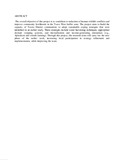| dc.description.abstract | The overall objective of this project is to contribute to reduction of human-wildlife conflicts and improve community livelihoods in the Tsavo West buffer zone. The project aims to build the capacity of Taveta District communities to adopt sustainable coping strategies that were identified in an earlier study. These strategies include water harvesting techniques, appropriate dryland cropping systems, and intensification and income-generating enterprises (e.g., Apiculture and ostrich farming). Through this project, the research team will carry out the next phase of the earlier work, increasing local participation in strategy refinement and implementation, while improving the team’s process of engagement with local communities and other stakeholders.
The project is being conducted in the semi-arid rangelands of Taveta District, which acts as a dispersal area for wildlife from Tsavo West National park. The District is bordered by Tsavo-West National Park to the East, the Kenya-Tanzania Border to the west and south, and Kajiado District to the north, and covers an area of 645Km2. Wildlife habitats in Taveta District were formerly used as pastoral grazing land, but have undergone tremendous changes in land use. The area is experiencing diminishing natural resources, fragmentation, reduced accessibility to water and grazing pastures, and unpleasant human-wildlife interactions. As resources become scarce, conflicts become almost inevitable as both wildlife and people strive to survive. In this ecosystem, increasing human-wildlife conflicts could be exacerbating food insecurity and negatively impacting livelihoods. | en_US |

